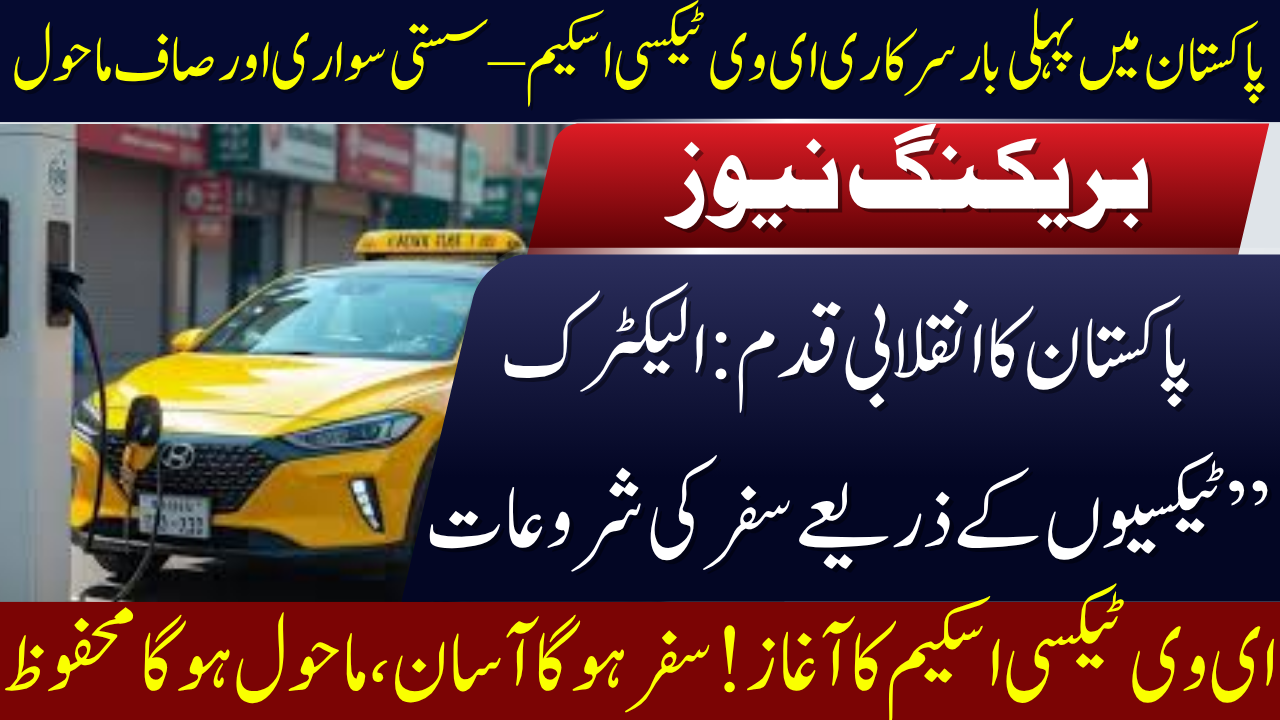In a historic move toward sustainable transportation, Pakistan is all set to launch its first government-run Electric Vehicle (EV) Taxi Scheme in 2025. This initiative is a milestone in the country’s green energy transition, aiming to reduce carbon emissions, provide affordable transport to citizens, and create employment opportunities for thousands of drivers.
The scheme will introduce a fleet of electric taxis across major cities, offering an eco-friendly alternative to traditional petrol and diesel-based vehicles. This project not only reflects the government’s commitment to combating climate change but also aligns with global trends of shifting toward cleaner and smarter mobility solutions.
Purpose of the EV Taxi Scheme
The government has highlighted several key objectives behind launching Pakistan’s first EV taxi service:
- Environmental Sustainability: Reduce air pollution and dependency on fossil fuels.
- Affordable Public Transport: Provide low-cost travel options for urban commuters.
- Green Jobs Creation: Employ thousands of drivers under a regulated system.
- Energy Efficiency: Utilize locally produced electricity and renewable sources for transportation.
- Innovation in Mobility: Encourage the adoption of electric vehicles nationwide.
Key Features of the EV Taxi Project
| Feature | Details |
|---|---|
| Scheme Name | Government EV Taxi Scheme |
| Launch Year | 2025 |
| Vehicle Type | Electric Cars (Zero-Emission) |
| Coverage | Major cities including Islamabad, Lahore, and Karachi (phase-wise rollout) |
| Beneficiaries | Daily commuters, drivers, and environment |
| Goals | Affordable, eco-friendly, and modern transportation |
How the Scheme Will Work
The EV taxis will operate under a structured and government-monitored system. A central dispatch service and mobile app will allow commuters to book taxis conveniently. Drivers will be hired and trained under government regulations to ensure safety, professionalism, and smooth service.
The taxis will be equipped with fast-charging battery technology, with designated charging stations being set up across major roads, bus terminals, and commercial areas. This will make EV taxis reliable for both short and long-distance urban routes.
Benefits for Citizens and Drivers
For Citizens:
- Lower transport fares compared to fuel-based taxis.
- Eco-friendly travel contributing to cleaner air.
- Safer and more comfortable rides with modern EV features.
For Drivers:
- Stable government-backed employment.
- Reduced operational costs due to cheaper electricity vs. petrol/diesel.
- Training in EV handling and customer service.
Why EV Taxis Matter for Pakistan
Pakistan faces significant challenges in the form of air pollution, rising fuel import bills, and urban traffic congestion. The introduction of EV taxis is a forward-looking solution to address these issues. By shifting to electric mobility, the country will:
- Cut down billions of rupees spent on fuel imports.
- Improve urban air quality and reduce smog.
- Boost investment in the local EV industry and charging infrastructure.
- Showcase Pakistan as a regional leader in green mobility initiatives.
Future Expansion Plans
While the initial rollout will be in major cities, the government has plans to expand the EV Taxi Scheme to other districts in phases. Alongside this, partnerships with private EV manufacturers and charging infrastructure companies are being discussed to ensure long-term sustainability.
There are also proposals to gradually introduce EV buses and ride-sharing services under the same initiative, making the shift toward clean mobility more comprehensive.
Conclusion
The launch of Pakistan’s first government-run EV Taxi Scheme in 2025 is not just about introducing a new transport option—it’s about reshaping the country’s mobility future. With benefits for citizens, drivers, and the environment, this scheme represents a major step toward a greener, smarter, and more affordable transportation system.
By adopting electric taxis, Pakistan is not only improving urban transport but also contributing to global climate goals. For commuters, this means cleaner rides; for drivers, better livelihoods; and for the nation, a sustainable path toward progress.
